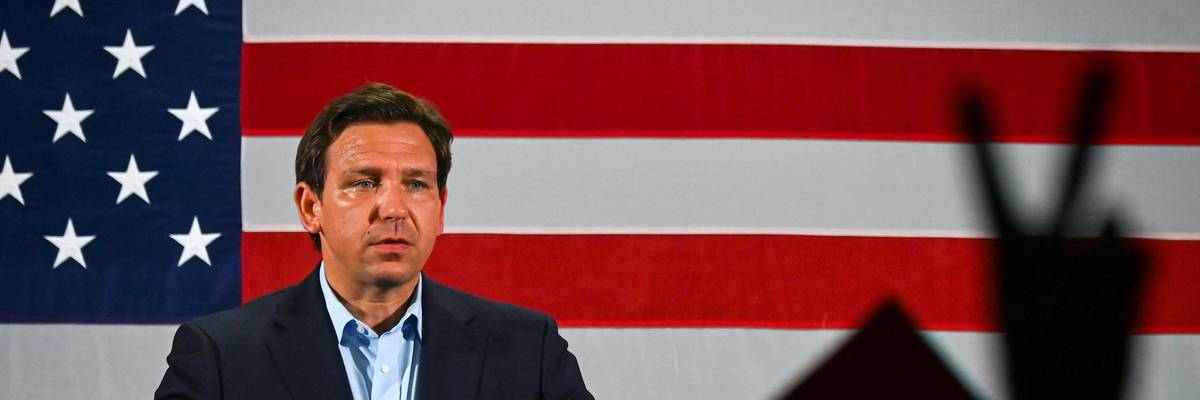In an order that begins by quoting the famous opening line of George Orwell's dystopian novel 1984, a federal judge on Thursday blocked key provisions of a Florida censorship law that aimed to restrict how state university professors teach race, gender, and U.S. history.
"'It was a bright cold day in April, and the clocks were striking thirteen,' and the powers in charge of Florida's public university system have declared the state has unfettered authority to muzzle its professors in the name of 'freedom,'" Judge Mark Walker of the U.S. District Court for the Northern District of Florida, an Obama appointee, wrote in his scathing decision, which temporarily halts enforcement of parts of the law championed by Republican Gov. Ron DeSantis--a possible 2024 presidential candidate.
"To confront certain viewpoints that offend the powers that be, the state of Florida passed the so-called 'Stop WOKE Act in 2022--redubbed (in line with the state's doublespeak) the 'Individual Freedom Act,'" Walker continued. "The law officially bans professors from expressing disfavored viewpoints in university classrooms while permitting unfettered expression of the opposite viewpoints. Defendants argue that, under this act, professors enjoy 'academic freedom' so long as they express only those viewpoints of which the State approves. This is positively dystopian."
The Thursday decision, which concludes that the GOP law violates the First Amendment rights of public university faculty and students, marks the second time Walker has ruled against the "Stop WOKE Act" in recent months. In August, the judge blocked the part of the law pertaining to private businesses.
Adriana Novoa, a University of South Florida history professor and a plaintiff in the case, said in a statement that Walker's Thursday ruling is a win "for the institutions of this country."
"I hope that the courts will defend the existence of a public education that cannot be manipulated by politicians to push any ideology, now and in the future," Novoa added.
Part of a recent wave of censorship laws advanced by Republicans in Florida and across the U.S., the "Stop WOKE Act" was billed as an attempt to "give businesses, employees, children, and families tools to fight back against woke indoctrination."
But civil liberties groups and other critics of the law have argued it is both unjustifiable and exceedingly vague in its mandates, creating a chilling effect on educators as they attempt to teach their classes under the threat of state retaliation.
Emily Anderson, an assistant professor of International Relations and Intercultural Education at Florida International University, told the Miami Herald in August that "these policies have really led to increased efforts to silence and surveil academic speech."
"Academic speech matters, because it's a fundamental freedom that is really how our university system is grounded," said Anderson. "When we have policies that threaten speech, in my view, it shadows threats to all other protected rights."
In his ruling, Walker points to the eight specific concepts outlawed that are under the measure, including the notion that "such virtues as merit, excellence, hard work, fairness, neutrality, objectivity, and racial colorblindness are racist or sexist, or were created by members of a particular race, color, national origin, or sex to oppress members of another race, color, national origin, or sex."
"Despite [Florida officials'] insistence that the professor plaintiffs' proposed viewpoints must serve as a mirror image for each prohibited viewpoint, the proposed speech needs only to arguably run afoul of the prohibition," Walker wrote.
Adam Steinbaugh, an attorney with the Foundation for Individual Rights and Expression (FIRE)--which sued Florida officials over the censorship law--said that "faculty members are hired to offer opinions from their academic expertise--not toe the party line."
"Florida's argument that faculty members have no First Amendment rights would have imperiled faculty members across the political spectrum," said Steinbaugh.
Emerson Sykes, senior staff attorney with the ACLU Speech, Privacy, and Technology Project, said in a statement that Walker's ruling "is a huge victory for everyone who values academic freedom and recognizes the value of inclusive education."
"The First Amendment broadly protects our right to share information and ideas, and this includes educators' and students' right to learn, discuss, and debate systemic racism and sexism," Sykes added.




